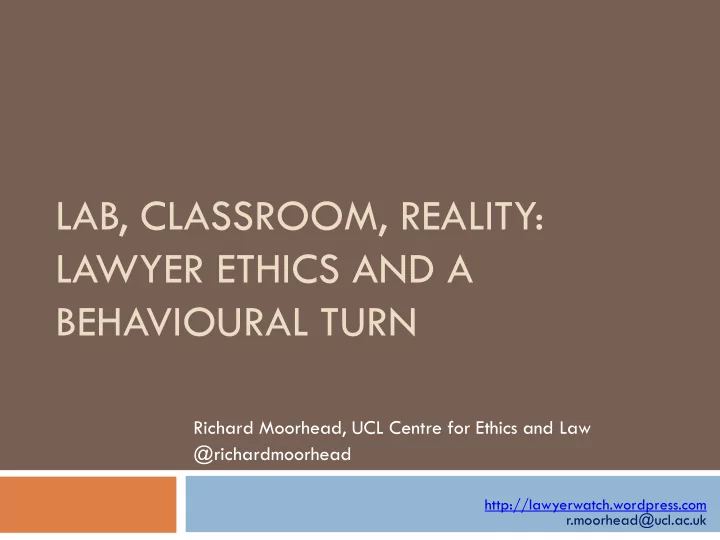

LAB, CLASSROOM, REALITY: LAWYER ETHICS AND A BEHAVIOURAL TURN Richard Moorhead, UCL Centre for Ethics and Law @richardmoorhead http://lawyerwatch.wordpress.com r.moorhead@ucl.ac.uk
My argument Research led teaching What we teach not just how we teach Law dominated by knowledge and doctrinal manipulation Context/philosophy Behavioural and economic approaches The best lawyers, the best law firms, the best governments, and the best critics need….
I learnt early on this was possible…
Lawyers and ethics
Lawyers’ philosophies
Structure [agency] Promotion to partnership PEP and other indicators Hourly rates/NWNF/Publics Reputation Business focus
The Triad Public Interest in the administration of justice Client Interest Firm Interest
Examples (allegations not proven) Reporting on ‘independent investigations’ to be shown to third parties Giving deliberately misleading evidence to a Parliamentary Committee “Continuing” to act for clients who lie in parliamentary investigations Threatening to sue on facts known to be untrue
Examples (allegations not proven) Giving opinion letters that may facilitate accounting fraud Avoiding regulatory detection in ways which appear to be illegal, $300m Preventing information getting to your client’s audit committee, $7bn
Traditionally ways of looking at these problems? Are rules broken? Power and structure? Philosophical choices? Yes, but….
Designing Ethics Indicators for Legal Services (Moorhead et al, 2012)
#itsagoodthinghonest
IHC: Should you give the opinion? You are GC at a large investment bank that wants to lower its leverage by engaging in off balance sheet accounting. There is room for doubt as to whether it is lawful under accounting rules, but your view is that it is probably not lawful. They ask you to give a piece of advice which does not touch on accounting rules that will help them make the case it is lawful. That opinion will be competent and correct but may lead to a fraud, but you do not know that it will.
Two noticeable phenomena They did not agree What guided their decision making
Motivation and reflection
Am I different? Universalism 2 1.5 Self-Direction Benevolence 1 0.5 0 -0.5 Stimulation Conformity -1 -1.5 -2 Group Mean Hedonism Tradition Achievement Security Power
Balance sheet problem… 77% said no Universalism 1.5 Self-Direction Benevolence 1 0.5 0 -0.5 Stimulation, .01 Conformity -1 No -1.5 Yes Hedonism Tradition Achievement Security, .1 Power
Other problems and experiments Values related to decisions Different types of lawyers
Lawyers: Practice and Ethics Professionalism – Professional Regulation Costs and incentives Quality and markets Innovation and technology The influence of business on inhouse Theories of ethics Values and ethical decision making Zeal and advocacy Truth telling and negotiation Confidentiality and privilege Creativity and responsibility
Things we could look at ‘in the lab’ Are “professionals” more or less ethical http://lawyerwatch.wordpress.com/2013/06/05/wha t-does-thinking-like-a-professional-mean/ How money influences behaviour De-biasing strategies Conflict of interest rules pretty limited As are informed consent strategies Are there better ways?
Rules The effect of different rules You should always act in good faith and do your best for each of your clients [You] must promote and protect fearlessly and by all proper and lawful means the lay client's best interests and do so without regard to [your] own interests or to any consequences to himself or to any other person
Out in the field Riskier cultures Complexity vs simplicity Principles vs rules Institutional design Good management Appetite for risk Tolerance of ambiguity
Not just behavioural experiments Three and a half minute contracts http://lawyerwatch.wordpress.com/2013/09/29/secu rities-lawyers-and-sticky-contracts-innovation-and-elite- law/ elders and betters boilerplate law firm systems the economics of contracts and commercial awareness Contracts as enterprise design not words on a page
Conclusions If lawyers are there to influence behaviour And ethics is about influencing our own behaviour for the better Then we need to be more behavioural Multi-disciplinary Invest in capacity Engage between practice and academy There are limitations and there will be failures But we need new ideas and practices
LAB, CLASSROOM, REALITY: LAWYER ETHICS AND A BEHAVIOURAL TURN Richard Moorhead, UCL Centre for Ethics and Law @richardmoorhead http://lawyerwatch.wordpress.com r.moorhead@ucl.ac.uk
Recommend
More recommend